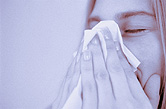- Recognizing the Signs of Hypothyroidism
- 10 Strategies to Overcome Insomnia
- Could Artificial Sweeteners Be Aging the Brain Faster?
- Techniques for Soothing Your Nervous System
- Does the Water in Your House Smell Funny? Here’s Why
- Can a Daily Dose of Apple Cider Vinegar Actually Aid Weight Loss?
- 6 Health Beverages That Can Actually Spike Your Blood Sugar
- Treatment Options for Social Anxiety Disorder
- Understanding the Connection Between Anxiety and Depression
- How Daily Prunes Can Influence Cholesterol and Inflammation
With Flu Season Here, Docs Offer Tips to Stay Healthy


FRIDAY, Nov. 1With another flu season fast approaching, those in the know offer ways to guard against infection or deal with the flu if your efforts fail.
“Immunization is the most important step in protecting yourself against the flu,” Dr. Kenneth Bromberg, director of the vaccine research center and chairman of pediatrics at the Brooklyn Hospital Center, in New York City, said in a hospital news release. “Everyone over the age of 6 months who does not have a life-threatening reaction to flu shots should be immunized.”
He added: “If someone cannot tolerate a flu shot, he can get immunized with a nasal spray, if under the age of 49.”
Bromberg noted that it takes about 10 days for flu immunization to be effective, so don’t wait to get vaccinated. Even if the immunization does not prevent the flu, it reduces the risk of death from the flu.
Another expert emphasized that immunization is safe.
“Flu vaccines are safe. They will not give you the flu,” Dr. David Hill, a professor of medical sciences and director of global public health in the school of medicine at Quinnipiac University, in Connecticut, said in a university news release.
Along with a flu shot, there are other “common-sense” ways that you can protect yourself and others against the flu, Hill added. These include the following:
- Avoiding close contact with people who are coughing and sneezing. One to two meters distance is considered a safe distance.
- Washing hands frequently.
- Covering your cough: Sneeze or cough into a tissue and promptly discard it safely in a wastebasket. If you don’t have a tissue, cough into your upper sleeve or elbow. And after coughing or sneezing into a tissue, wash your hands.
- If you have flu symptoms, stay home from work and school, and don’t go into public places.
The flu vaccine is the most effective way to prevent the flu, agreed Dr. Aida Vega, director of the primary care program at the Mount Sinai Faculty Practice Associates., in New York City.
What should you do if you develop flu symptoms such as fever, cough and sore throat?
Most people with flu have mild illness and do not need to be seen by a doctor. But people with underlying health conditions that put them at increased risk of complications from flu should contact their medical provider to determine if they need to be evaluated or treated, Vega said.
If you suspect you have the flu and you go to see a doctor other health care provider, ask office or hospital staff for a face mask to help prevent the spread of the flu virus, Vega recommended.
If you have more severe symptoms, such as difficulty breathing, chest pain, dizziness or confusion, seek immediate medical care, she said.
More information
The U.S. Centers for Disease Control and Prevention has more about the flu.
Source: HealthDay
Copyright © 2026 HealthDay. All rights reserved.










